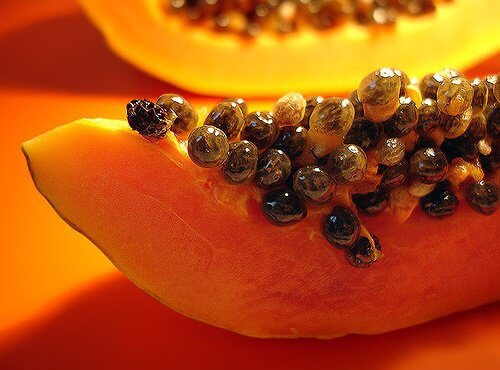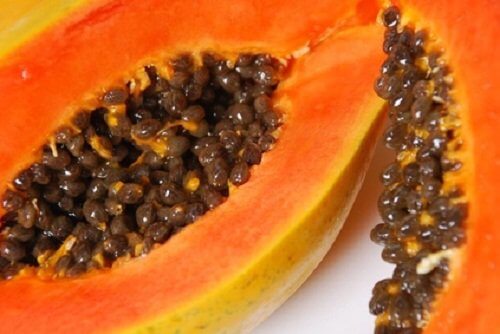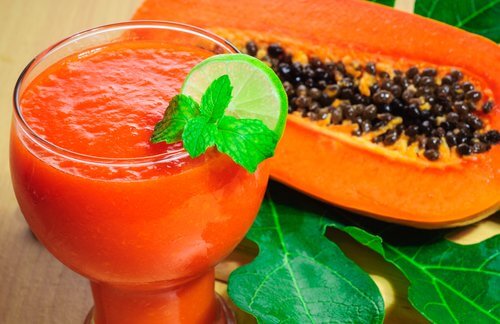Benefits of Eating Papaya and the Seeds


Reviewed and approved by the doctor José Gerardo Rosciano Paganelli
In some tropical countries, you can find papaya trees everywhere. They are easy to grow and produce delicious fruit. Also, papaya may help reduce the risk of cancer and has natural healing properties. Until recently, people just thought of papaya as delicious fruit. In fact, there are many benefits of eating papaya and the seeds.
You might like: Detox Your Body with Papaya and Pineapple
The Health Benefits of Eating Papaya
Papayas contain an enzyme known as papain, which is very similar to the pancreatic enzymes that promote digestion of proteins. These protein-digesting enzymes may also dissolve the protein layer that forms around cancer cells. That helps the immune system destroy them more easily.
In addition, there’s another enzyme found in papaya fruit called chymopapain. Together, these two enzymes help the body better absorb protein.
These enzymes can break down the defense shields of viruses, tumors, allergens, yeasts, and fungi. Once those shields are destroyed, it’s easier for the body to heal.
Papain also helps reduce inflammation, heal burns, and reduce scarring of the skin. As a result, the benefits of eating papaya include speeding up your natural healing process.
Carotenoids that Protect Against Free Radicals

According to a study in China, eating foods rich in lycopene and drinking green tea may help protect against prostate cancer.
Isothiocyanate to Prevent the Formation of Cancer Cells
Isothiocyanate is another compound found in papaya. According to research, it may slow the formation and development of cancer cells. Furthermore, in animal studies, it was shown that isothiocyanates may help protect against certain types of cancers.
You might like: The Causes and Diagnosis of Lung Cancer
Additional Benefits of Eating Papaya

- Papayas are rich in nutrients, antioxidants, carotenes, vitamins C, E and A, and flavonoids.
- Papayas contain B vitamins and folic acid – as well as minerals like potassium and magnesium. All of these promote cardiovascular health and may help protect against cancer.
- Additionally, papayas help maintain a healthy immune system, prevent ear infections, and fight colds and the flu.
- Papaya is rich in fiber, which can reduce levels of bad cholesterol. Fiber also binds to cancer-causing toxins in the colon. This aids their removal from the body and assists in digestion.
- Papaya has a wonderful flavor and smooth texture that can make your recipes more interesting!
Benefits of Eating Papaya Seeds
Papaya seeds can be even better for you than the fruit. They have a spicy, bitter flavor, which can take some getting used to. Nevertheless, here are some important medicinal benefits of eating papaya seeds:
- Antibacterial properties, which may help protect against infections.
- They may help protect against detoxify the kidneys and liver.
- They may help facilitate the removal of intestinal parasites.
Clearly, it’s worth adding papaya to your diet and you should try to eat papaya or seeds once a week. Thanks to unique flavor, it can be added to many dishes such as soups, salads, yogurt, and chili. Don’t miss the opportunity to enjoy the incredible health benefits of eating papaya.
All cited sources were thoroughly reviewed by our team to ensure their quality, reliability, currency, and validity. The bibliography of this article was considered reliable and of academic or scientific accuracy.
-
Teixeira, J.A.; Rashid, Z.; Tan, D.; Sivakumar, D.; Gera, A.; Teixeira, M.; Tennant, P. F. (2007). Papaya (Carica papaya L.) Biology and Biotechnology. Tree and Forestry Science and Biotechnology. https://doi.org/10.1136/bmj.282.6264.598.
-
Teixeira, J. A., Rashid, Z., Tan, D., Dharini, N., Gera, A., Teixeira, M., … Tennant, P. F. (2007). Papaya ( Carica papaya L .) Biology and Biotechnology. Africa.
-
Melo, E. de A., Maciel, M. I. S., Lima, V. L. A. G. de, & Nascimento, R. J. do. (2008). Capacidade antioxidante de frutas. Revista Brasileira de Ciências Farmacêuticas. https://doi.org/10.1590/S1516-93322008000200005.
-
Harvey, R. (2011). Vitaminas. In Bioquímica. https://doi.org/10.15713/ins.mmj.3.
- Misas Villamil JC., Van der Hoorn RA., DOehlemann G., Papain like cystein proteases as hubs in plant immunity. New Phytol, 2016. 212 (4): 902-907.
- Chen YY., Lu YH., Ma CH., Tao WW., et al., A novel elastic liposome for skin delivery of papain and its application on hypertrophic scar. Biomed Pharmacother, 2017. 87:82-91.
- Chen P., Zhang W., Wang X., Zhao K., et al., Lycopene and risk of prostate cancer: a systematic review and meta analysis. Medicine (Baltimore), 2015.
- Kim H., Jang M., Kim Y., Choi J., et al., Red ginseng and vitamin C increase immune cell activity and decrease lung inflammation induced by influenza A virus/H1N1 infection. J Pharm Pharmacol, 2016. 68 (3): 406-20.
- Sima P., Vanucci L., Vetvicka V., B glucans and colesterol (review). Int J Mol Med, 2018. 41 (4): 1799-1808.
- Amin AH., Bughdadi FA., Abo Zaid MA., Ismail AH., et al., Immunomodulatory effect of papaya (Carica papaya) pulp and seed extracts as a potential natural treatment for baceterial stress. J Food Biochem, 2019.
This text is provided for informational purposes only and does not replace consultation with a professional. If in doubt, consult your specialist.








